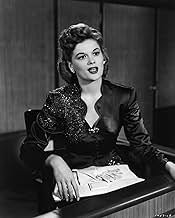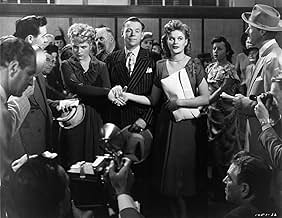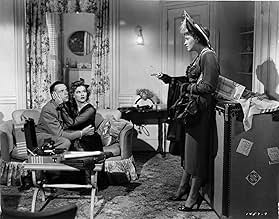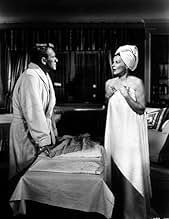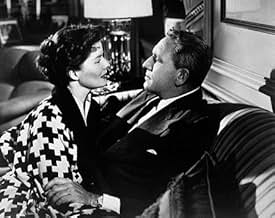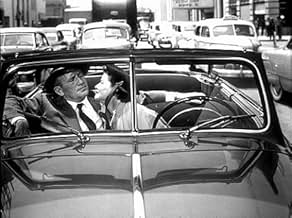NOTE IMDb
7,4/10
23 k
MA NOTE
Les tensions familiales et professionnelles augmentent lorsqu'un mari et une femme travaillent comme avocats opposés dans une affaire impliquant une femme qui a tiré sur son mari.Les tensions familiales et professionnelles augmentent lorsqu'un mari et une femme travaillent comme avocats opposés dans une affaire impliquant une femme qui a tiré sur son mari.Les tensions familiales et professionnelles augmentent lorsqu'un mari et une femme travaillent comme avocats opposés dans une affaire impliquant une femme qui a tiré sur son mari.
- Nommé pour 1 Oscar
- 1 victoire et 4 nominations au total
Edward Andrews
- Kip's neighbor
- (non crédité)
Bonnie Bannon
- Woman in Courtroom
- (non crédité)
Charles Bastin
- Young District Attorney
- (non crédité)
Harry Baum
- Commuter
- (non crédité)
Joseph E. Bernard
- Mr. Bonner - Adam's Father
- (non crédité)
Histoire
Le saviez-vous
- AnecdotesInspired by the real-life story of husband-and-wife lawyers William Dwight Whitney and Dorothy Whitney, who represented Raymond Massey and his ex-wife Adrianne Allen in their divorce. After the Massey divorce was over, the Whitneys divorced each other and married the respective Masseys.
- GaffesDuring the trial proceedings, a Black juror was in the first row, but the trial scene following the argument between Amanda and Adam where Adam walks out of the home, the jury makeup has now changed and the Black juror is not present. However the following day when court resumes for the jury verdict, the Black juror is back in the jury box.
- Crédits fousOpening credits are little curtains that go up and down, on a stage in a performance hall.
- Versions alternativesAlso available in a computer colorized version.
- ConnexionsEdited into Hollywood: The Dream Factory (1972)
- Bandes originalesFarewell, Amanda
(1949)
Music and Lyrics by Cole Porter
Played during the opening credits and often in the score
Sung by David Wayne (uncredited), accompanying himself on the piano
Reprised by the voice of Frank Sinatra (uncredited) on the radio
Whistled by Katharine Hepburn (uncredited)
Sung a cappella by Spencer Tracy (uncredited)
Commentaire à la une
Spencer Tracy and Katharine Hepburn worked so smoothly together that it's almost difficult to fault their films. Hepburn's admiration for Tracy off-screen is hard to ignore, but she was a character actress first and foremost (and THEN a movie star), and she's deeply in character here and believable. Tracy, on the other hand, took movie-making with a grain of salt--we don't see his indifference, but we do see his casual 'naturalness,' his underplaying. Spencer Tracy overacts at underplaying, mumbling some of his throwaway lines for effect or overlapping Hepburn's dialogue with his. This non-effort actually shows effort, and turns this comedy into an actor's exercise. It's not very funny anyway: married lawyers take opposite sides of a spousal-abuse case. Dated battle-of-the-sexes doesn't give Judy Holliday much to work with (word has it this was her screen-test for "Born Yesterday"). It's all very smart and sophisticated on the surface, but callow at its core. Screenwriters Ruth Gordon and Garson Kanin received Oscar nominations for their script, which disintegrates into door-slamming farce. ** from ****
- moonspinner55
- 17 juil. 2004
- Permalien
Meilleurs choix
Connectez-vous pour évaluer et suivre la liste de favoris afin de recevoir des recommandations personnalisées
Détails
- Durée1 heure 41 minutes
- Couleur
- Rapport de forme
- 1.37 : 1
Contribuer à cette page
Suggérer une modification ou ajouter du contenu manquant

Lacune principale
By what name was Madame porte la culotte (1949) officially released in India in English?
Répondre


